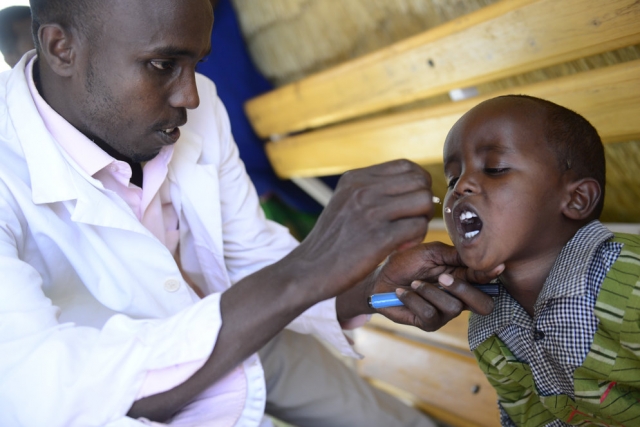Strong political commitment, equitable access, and active engagement of communities key to sustaining immunization gains in Africa
 Brazzaville, 14 July 2016 -- Sustaining the gains that have been made in the drastic reduction of vaccine preventable diseases in the Region, strengthening immunization systems, and ensuring that everyone has access to immunization were some of the issues discussed at the Regional Immunization Technical Advisory Group (RITAG) meeting which ended last week in Brazzaville, Congo.
Brazzaville, 14 July 2016 -- Sustaining the gains that have been made in the drastic reduction of vaccine preventable diseases in the Region, strengthening immunization systems, and ensuring that everyone has access to immunization were some of the issues discussed at the Regional Immunization Technical Advisory Group (RITAG) meeting which ended last week in Brazzaville, Congo.
The RITAG serves as the principal advisory group to the WHO Regional Office for Africa (WHO AFRO) for strategic guidance on vaccines and immunization. The RITAG advises the Regional Director on overall regional policies and strategies, ranging from vaccine and technology research and development to delivery of immunization services and linkages between immunization and other health interventions.
The RITAG meeting was attended by more than 120 delegates from different countries and international organizations including United Nations agencies, bilateral and multilateral development institutions, government and non-governmental organizations working to improve access to immunization services in Africa.
Dr Matshidiso Moeti, WHO Regional Director for Africa, called on countries in the African Region to intensify efforts towards achieving adequate routine immunization coverage and having a robust surveillance network to rapidly detect and respond to vaccine-preventable diseases. She called for more emphasis to be placed on integration of activities to support the overall strengthening of the health system.
The Regional Director also noted that strong political commitment and active engagement of communities in demanding vaccines and immunization services are critical to achieving the Global Vaccine Action Plan (GVAP) goals within the Region. “Generating and maintaining political support for such an action is a major undertaking and will require the engagement of several constituencies. Political stakeholders require data and key messages to strengthen their advocacy activities; we need champions to generate broad public support; and communication between governments and international and local partners will be critical,” she said.
Professor Helen Rees, Chairperson of the RITAG, also reflected the same conviction as she underscored the importance of country ownership and expanding immunization coverage across the Region.
The meeting discussed approaches countries can use to optimize their immunization coverage and promote equity; how best to address the ongoing yellow fever and meningitis outbreaks in the Region; vaccine regulation; and, universal access to immunization in the context of universal health coverage. The RITAG also recommended active engagement of communities in the planning, resourcing and delivery of quality immunization services, as well as in advocacy for immunization.
At the end of the three-day meeting, the advisory group recommended that countries and donors should maintain – if not increase – the current level of investment in immunization given the importance of immunization in socio-economic development. The RITAG welcomed the political commitments made by African governments during the Ministerial Conference on Immunization in Africa (MCIA) held in Addis Ababa in February 2016 while at the same time noting that these commitments must be backed by appropriate resources and action.
Immunization is one of the most powerful and cost-effective public health interventions, and one of the pathways to attaining universal health coverage. WHO and immunization partners will continue to work with and advise countries to ensure that obstacles are overcome and gains sustained in increasing equitable access to immunization in Africa through country ownership and active community engagement.
_______________________________
For more information, please contact:
Dr Richard Mihigo, Programme Manager – Immunization and Vaccine Development, WHO AFRO mihigor [at] who.int (mihigor[at]who[dot]int), Tel: +47 24139926, Mob: +242 05 744 6908
Loza Mesfin Tesfaye, Communications Officer, WHO AFRO tesfayel [at] who.int (tesfayel[at]who[dot]int) Tel: +47 241 39420, Mob: +242 04 480 0212
C. Boakye-Agyemang, Regional Communications Adviser, WHO AFRO boakyeagyemangc [at] who.int (boakyeagyemangc[at]who[dot]int) , Tel: +47 241 39420, Mob: +242 06 520 6565


